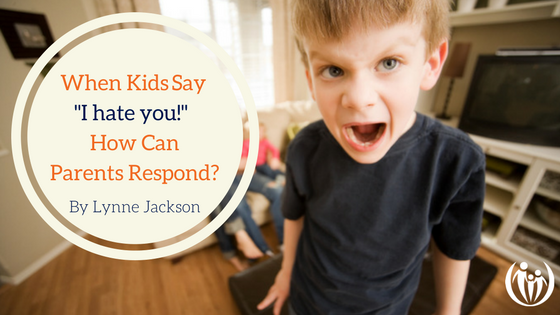
When Kids Say “I Hate You!” How Can Parents Respond?
“I hate you!” There are certainly plenty of parents who have heard those disrespectful words.
Some parents are deeply hurt (“I can’t believe you would say that, after all I do…”) while others get intensely angry (“It’s not okay to talk to me like that!”). Parents often feel attacked and unsure about how to respond.
A popular parenting approach suggests when a child says “I hate you” or a similar comment, that parents respond with “Aren’t you glad I don’t believe that?” At first glance this may seem like a clever, calm way to respond, but it also is pretty condescending, communicating a message that, “When you’re upset, you are a liar” or “Your thoughts and feelings are unimportant, even invalid to me.”
So how can we really get to the root of the issue when our kids yell that they hate us?
The thing is, when kids say things like “I hate you!” there is often something else going on under the surface. When kids get angry, sometimes that anger can be a clumsy expression of a child’s frustration, discouragement, or even deep despair in some other area. As we consider how to respond, we can take a moment to look deeper and ask, “What might be driving my child’s intense feelings right now?” This gives us insight into what’s really going on with our children underneath the angry words of the moment.
One mom was able to resolve her young son’s struggle with “I HATE YOU, MOM!” when she realized what was discouraging him: his little brother was staying dry at night, but he wasn’t, and he felt really ashamed. When she asked him if that was bothering him, he burst into tears. She reassured him of her love no matter what, and he no longer needed to vent his discouragement at her.
Once we take a moment to gain a little insight, we can be thoughtful about making sure our responses communicate to our kids the messages we want to be communicating. For example, empathizing with their feelings (“You seem upset right now. That’s pretty hard.”) communicates to kids that “Your thoughts and feelings are valid, and I care about what you’re feeling” instead of brushing them off.
So, consider important messages you might want to communicate when your child launches an “I hate you!” (or some similar hurtful comment). Here are some ideas:
- I can handle hearing about your intense feelings.
- You are loved. All the time. Not just when you are respectful and calm.
- Your thoughts and feelings matter – I want to give my best shot at helping you identify and express them wisely.
- We are a team to solve the problem beneath the conflict.
So how might the desire to communicate those messages work out practically? There are endless possibilities, but here is an example for a younger child: “You must be really mad now! When you’ve calmed down I really want to understand why you’re so mad. Hopefully we can figure out a solution.”
Or for an older child… “I’m concerned that’s a pretty dishonoring statement. But I love you and I’m much more concerned about the feelings underneath it. Why don’t you think it through and let’s talk after dinner.”
When you respond in these ways you win true respect from your child, and they are one small step closer to being able to replace “I hate you!” with “I’m really upset now, so I want to talk about this problem when I’m calmer.”
Apply It Now:
- Think of a situation where your child came at you with angry or hurtful words. What might be some of the feelings or factors underneath the surface, fueling your child’s intense emotions?
- What message(s) do you want to communicate to your child in that moment?
- Brainstorm a couple statements you could say and practice them, just in case.
Download our FREE in-depth ebook Helping Kids With Anger. It will provide thoughtful insights and creative ideas to help your struggling child.

